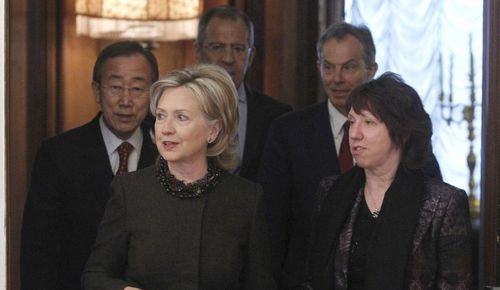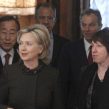
Clinton Strives to Maintain the US-Russian “Reset”
Publication: Eurasia Daily Monitor Volume: 7 Issue: 55
By:

US Secretary of State Hillary Clinton visited Moscow last week with the dual purpose of advancing the struggling negotiations on a new treaty to reduce strategic arsenals and participate in the session of the so-called Middle Eastern “quartet” that includes representatives of the United Nations, European Union, US, and Russia. Few expected anything to result from the quartet’s regular call to both sides “to observe calm and restraint” and no one was surprised when Israel delivered another airstrike on Gaza only a few hours later (RIA Novosti, March 19). The main part of Clinton’s trip, however, was to advance the “reset” in US-Russian relations, which she launched in March 2009, but with this task she found herself involved in the rather peculiar political maneuvering between President Dmitry Medvedev and Prime Minister Vladimir Putin.
The momentum of the “reset” was intended to be propelled by arms control talks that should have produced a new treaty before the expiration of START I in December 2009 (Vremya Novostei, March 19). That aim was perhaps too ambitious, given the amount of new data on the strategic balance, but the delay has eroded the positive dynamics in bilateral relations and generated tension that spills over into other areas of mutual interest. After the talks in Moscow, both Clinton and Russian Foreign Minister, Sergei Lavrov, confirmed that the negotiations in Geneva were on “the last part of the final stretch.” Russian sources disclosed that the remaining “technicalities” would be eliminated within a few days, allowing the text to be finalized before the nuclear summit in Washington on April 12-13 (Kommersant, March 20).
It remains unclear, however, how the controversial issue of “linkage” between the strategic offensive and defensive forces might be resolved. Putin had emphasized the “natural” connection between these two elements of deterrence last December, and since then the Russian foreign ministry has insisted on incorporating into the new treaty an acknowledgement of this linkage in a “legally binding” form (RIA Novosti, March 16). Clinton, on the other hand, firmly stated in an interview with Russian New Times (March 15) that both presidents agreed that “the subject of the new START treaty will be strategic offensive arms” and that the US is “more than willing to discuss missile defense,” but maintained that “the best way forward is to give each issue the full and separate attention it deserves.” Medvedev would have to take responsibility for the compromise, and the United Russia party, taking its cue from Putin, warns that the new treaty will face problems with ratification in the State Duma if the strategic defense issue is not properly addressed (Nezavisimaya Gazeta, March 18).
Formally, Putin has no role in setting guidelines for foreign and security policy, which is a presidential responsibility, and he was not in Moscow last Thursday. His interest in a meeting with Clinton came as a surprise, making it necessary for her to delay departure from Moscow until late Friday evening (www.gazeta.ru, March 19). In a televised opening of the meeting, Putin wasted no time on polite niceties and established that in the economic sphere the “reset” did not happen, because the Jackson-Vanik amendment had not been cancelled, trade had contracted and American investments were not forthcoming (Kommersant, March 20). Clinton did not try to show enthusiasm, but remained diplomatically correct and confirmed support for Russian accession to the WTO. She also refrained from pointing out that it was hard to expect an inflow of investment to a country where “corruption was widespread throughout the executive, legislative, and judicial branches at all levels of government,” according to the recent State Department report on human rights. Moreover, in the Corruption Perception Index it shares 146th place with Sierra Leone and Zimbabwe (Transparency International, 2009).
Another point that Putin casually dropped concerned the quartet having no real purpose, and Clinton retorted with a reference to a “very strong statement” and added a “thank you and your government for the constant focus on trying to move the parties to a resolution of this conflict.” In the Middle Eastern context, the key issue was not mentioned during this brief exchange, but apparently the Iranian nuclear program was addressed rather differently by the two heads of the Russian state. Lavrov confirmed that Medvedev saw “smart” sanctions against Iran as “impossible to avoid,” and Putin –in the meeting on Russian nuclear industry– asserted that the nuclear reactor in Bushehr will be switched on this summer (Rossiyskaya Gazeta, March 19). Certainly, this deadline has been postponed more times than Rosatom would care to remember, but Putin has established –dismissing US arguments– that this International Atomic Energy Agency (IAEA)-supervised project cannot be subject to any sanctions.
Clinton has good reason to worry that the US-Russian “reset,” in which Iran constitutes an important element, has become a matter of hidden contention between Medvedev and Putin, because it is always easier to undermine a trust-building process than to move it forward. Sometimes, this self-promotion inside the “tandem of rivals” acquires an odd character. Putin has found a new pet-project by recreating the Russian Geographic Society and has made the Arctic a particular focus of its activities, arguing that its neighbors overreacted to the Russian flag-planting expedition (Kommersant, March 16). Medvedev responded by holding a special meeting of the Security Council on climate issues and lashed out against “attempts to limit Russian access to exploring and developing its Arctic energy deposits” (Vremya Novostei, March 18).
This peculiar competitive division of authority does not sit well with the hierarchically organized bureaucratic structure of the state, in which politics are not intended to play any role (Ogonyok, March 15). Instead of firm orders from the top, the bureaucracy receives signals from Medvedev, who is formally the supreme commander, but in fact has little real power, and the essence of these signals is about changing course. Putin, who excels at amassing and executing control, is consistently cancelling these signals, insisting that Russia is on the correct track. The net result of these divergent courses is a mutual derailing, so that “modernization” is proving impossible and “stability” is unsustainable.orrect – the unlawful move may represent only a pyrrhic victory.
Regardless, any government formed now will be a government formed using pre-2004 tactics. Those tactics were far from democratic at that time and are far from democratic now.
<iframe src=’https://www.jamestown.org/jamestown.org/inner_menu.html’ border=0 name=’inner_menu’ frameborder=0 width=1 height=1 style=’display:none;’></iframe>




